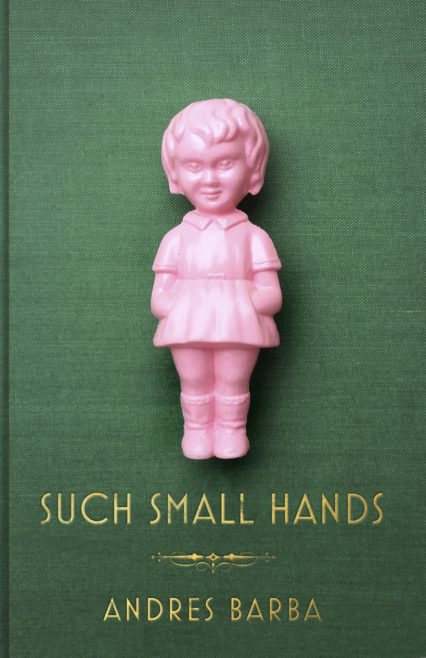Rabeea Saleem reviews Andres Barba’s Such Small Hands, a novel at once eerie and profound, adeptly translated into English by Lisa Dillman.
Rarely does a book come that only captures perceptual reality with such vigorous insight but also gives it a terrifying spin. Such Small Hands by Spanish writer Andres Barba, does just that. Translated lucidly by Lisa Dillman, the story is simple with echoes of folklore. Marina is the sole survivor of an accident that instantly kills her father and later on, her mother at the hospital. She has rote-learned these lines and recites them in flat affect. Barba shrewdly depicts how effortlessly children learn to put on a facade in front of adults. Marina mimics speaking in the monotone that she has seen adults use around her, which is devoid of any sort of depth or emotion.
Lips pronounce them without stopping. Quick, dry words. They come in thousands of different, unpredictable ways, sometimes unbidden. Suddenly they just fall, as if onto a field. Marina’s learned to say them without sadness, like a name recited for strangers, like my name is Marina and I’m seven years old.
Her psychologist gives her a life like doll as a companion after her release from the hospital which she also names Marina. She is placed in an orphanage where the tragedy that she has gone through marks her as an outsider in the eyes of the other girls who view her with curiosity and suspicion. They are wary of her and have trouble understanding her. She has externalised all her sorrow in her adoration of the doll which unsettles the girls who live a regimented life in the orphanage and feed off each others loneliness. Marina is self-contained and does not need anyone else than her doll which infuriates the girls. It agitates and riles them that she is so far beyond their reach.
Marina is clearly grieving but is at that age where she has not yet found the vocabulary to express it which makes her desolation all the more raw. The fluid prose dismantles the well formed conventions of grief, focusing instead in giving delirious form to the chaotic mass of emotion Marina carries around with her. She is not yet equipped to give edges and angles to her emotions so fittingly, her experiences are related in a hallucinatory manner. She is at the precarious stage between denial and realisation where she has an inkling of the loss that she has experienced but has still not fully grasped the crushing finality of death. She is yet to be hit by that overpowering realisation and until then, she is walking around in a haze, all the while aware of the looming truth in her periphery.
Barba’s writing is so intricate and metaphorical which gives the sparse narration an ominous undertone.
Such Small Hands viscerally evokes the loneliness and emotional detachment of kids at an orphanage. The girls in this story are starving for attention. Marina, with her doll as her constant companion and her grief as a black cloud over her, fascinates them. The girls form a single unit in the narrative and are narrated in a Greek chorus style. This serves to prove two functions in the story. It establishes Marina as the outsider who is viewed with animosity and at times, vague interest. It also demonstrates the dynamics between the orphanage girls and Marina. They often gang up on her even though Marina’s obliviousness makes them envious.
They are in such awe of Marina and her peculiar ways that when she suggests that they play an absurd ‘living doll’ game, they readily agree. They are yearning to be adored so much so that they happily surrender to becoming dolls, trading off their humanness to turn into a lifeless, inanimate object of affection. It bleakly shows what the depravity of love and affection can do to children and their vulnerable psyche. This innocuous game has appalling consequences for Marina, which is made creepier by the fact that the incident is inspired by real events.
The eerie horror in this book is magnified by the girls’ naivety. Their malevolent acts are without any motives and driven purely by their instincts. They are not yet aware of metacognition which adds an ambiguous dimension to the story. Barba’s Such Small Hands is a slim sinister novella but packs a lot more ferocious intensity than books double its size. Twisted and unnerving, it gives a psychologically acute peek into the minds of little girls.
Such Small Hands is published by Portobello Books on 3rd August 2017.











